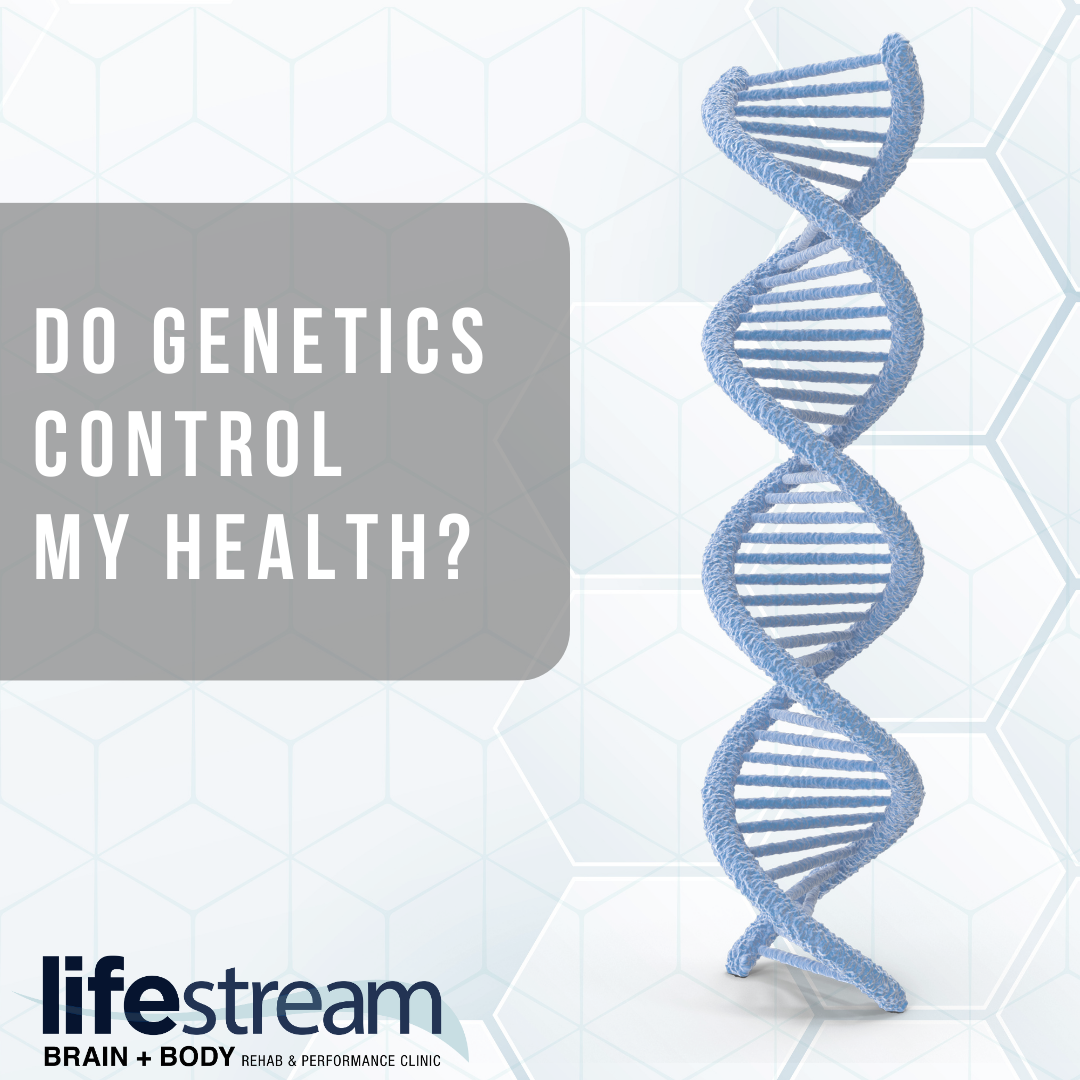Genetics and Health
It has become a common thing to blame genetics as the reason for a lot of health maladies. What role do genetics play in health and the development of disease?
To tackle this question, we must first understand the role and function of genetics. Every single cell in your body (except red blood cells) has a unique set of genetic material made up of DNA which is a series of codes that specific molecules can read and do certain things with. It is essentially just a recipe that your body attempts to follow. “Genes” are sections of your DNA that code for a specific thing. For example, you have specific genes that dictate every physical attribute about your yourself and also what proteins get made that run every process that happens in your body.
If all cells have the exact same DNA and set of genes, how then can you have different cells in the body that function and look completely different? This is the completely amazing and miraculous thing about how we were created. A neuron can be up to 4 feet long and is completely different from a cell that makes and secretes hydrochloric acid into the stomach for digestion. These differences in the structure and function of cells happen when certain genes are turned on or off during the process in which new cells are created and mature. These differences in gene expression in a particular cell also dictate the needs for that particular cell (in terms of energy or nutrients) and therefore the function that cell is responsible for (i.e. making stomach acid, making and releasing hormones, providing structure, receiving and sending nerve signals, etc). These functions are accomplished by hundreds or even thousands of proteins that are produced by the cell’s DNA.
There are genetic disorders that are passed on that directly affect a certain protein’s function in the body and cause an inevitable disease such as Down syndrome or Sickle Cell Anemia. In other cases, there are genetic variations in inherited genes that result in things like varying reactions to medications, “predisposition” or even protection for a certain disease, or nothing at all. Genetic “predisposition” means that because of a certain gene variant, you may be more susceptible to a certain disease but it does not mean that you will develop the disease. There are other factors like lifestyle and environment that also affect the development of a potential disease positively or negatively. For example, it has been shown that healthy lifestyles (exercise, diet, stress management, etc.) can counteract a genetic predisposition to being overweight.
What does this all mean for your health?
You may or may not know of any genetic variations you have that could have potential impacts on your health. However, more and more research is showing that genetics are just a part of disease development. Epigenetics are another factor. “Epi” means above or upon. Therefore, “epi-genetics” means upon or on top of genetics. Epigenetic changes do not change the DNA itself, but are external and can change how the body reads a certain gene (turning it on or off). Some of these changes are reversible and are impacted positively or negatively by lifestyle (diet, alcohol, exercise), exposure to environmental toxins (metals, endocrine-disrupting chemicals), and environment (in utero, stress, work habits). In early childhood, the brain is particularly susceptible to epigenetic change through positive and negative experiences. Others of these changes can become permanent after long-term adverse experiences.
While a lot of the environments in which you grew up in and the genetics you were given are out of your control, there are changes you can make now that can positively impact your health and longevity.
Here are some positive diet and lifestyle changes that have been shown to impact epigenetics:
– Folate and Vitamin B12: Both of these B vitamins are essential in DNA metabolism and are epigenetically active.
– Dietary patterns: Fruits, vegetables, legumes, whole grains, and healthy fats (less saturated fats and red meats)
– Physical activity: Exercise and overall physical activity has been shown to be epigenetically protective.
Here are some substances that have been known to negatively impact epigenetics:
– Endocrine-disrupting chemicals: These types of chemicals interfere with our body’s hormone signaling pathways. Examples of these chemicals include phthalates and parabens (used in beauty and personal care products), BPA, Atrazine (herbicide), etc. (refer to this earlier blog post for more information)
– Heavy metals and environmental pollutants: arsenic, lead, mercury, and air pollution (refer to this earlier blog post for more information)
– Alcohol and tobacco consumption: Overconsumption of both of these substances are pro-inflammatory and associated with increased risk of cancer and other diseases.
This information is not meant to scare you or make you feel like you can control every thing that happens in your body. Sometimes things still happen that we can’t control or that we tried to actively prevent. Please reach out to your doctor if you would like assistance in figuring out how you can change your lifestyle to positively benefit you and your genetics!
Sources:
https://nigms.nih.gov/education/fact-sheets/Pages/genetics.aspx#:~:text=Genetics%20is%20the%20scientific%20study,that%20help%20the%20body%20work.
https://www.ludwig.ox.ac.uk/news/investigating-mechanisms-of-gene-repression#:~:text=Two%20main%20mechanisms%20of%20gene,containing%20histone%20deacetylases%20(HDACs).
https://medlineplus.gov/genetics/understanding/mutationsanddisorders/predisposition/
https://medlineplus.gov/genetics/understanding/mutationsanddisorders/mutationscausedisease/
https://www.ncbi.nlm.nih.gov/books/NBK26821/#:~:text=DNA%20encodes%20information%20through%20the,chemical%20structure%20of%20the%20DNA.https://medlineplus.gov/genetics/understanding/basics/gene/https://www.ncbi.nlm.nih.gov/books/NBK26885/#:~:text=The%20genome%20of%20a%20cell,sets%20of%20genes%20are%20expressed.
https://developingchild.harvard.edu/science/deep-dives/gene-environment-interaction/#:~:text=Positive%20experiences%2C%20such%20as%20exposure,process%20is%20called%20epigenetic%20modification.
https://www.ncbi.nlm.nih.gov/pmc/articles/PMC3752894/
https://www.cdc.gov/genomics/disease/epigenetics.htm#:~:text=Unlike%20genetic%20changes%2C%20epigenetic%20changes,body%20reads%20a%20DNA%20sequence.
https://www.ncbi.nlm.nih.gov/pmc/articles/PMC4783933/#:~:text=Several%20recent%20studies%20have%20indicated,differentiation%20%5B13%2C14%5D.
https://www.ncbi.nlm.nih.gov/pmc/articles/PMC6275017/
https://www.ncbi.nlm.nih.gov/pmc/articles/PMC9953584/#:~:text=Exercise%2DInduced%20Epigenetic%20Modifications%20in,both%2C%20can%20alter%20the%20epigenome.
https://onlinelibrary.wiley.com/doi/10.1111/bcpt.12878
https://www.niehs.nih.gov/health/topics/agents/endocrine/index.cfm
https://www.endocrine.org/patient-engagement/endocrine-library/edcs
https://www.ncbi.nlm.nih.gov/pmc/articles/PMC4395649/

